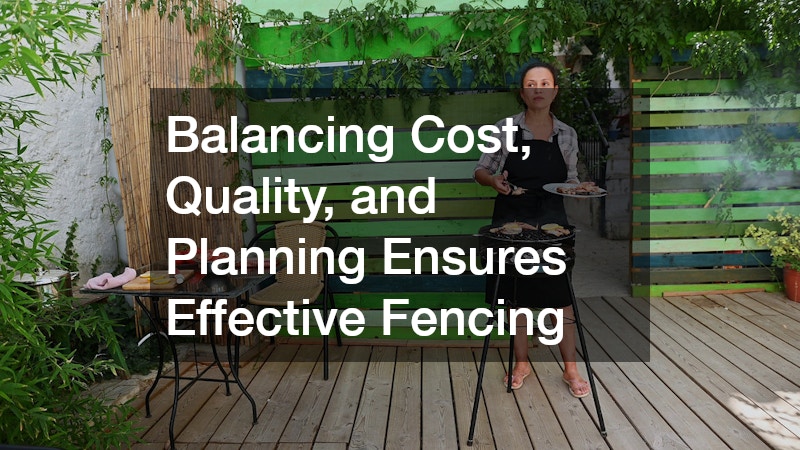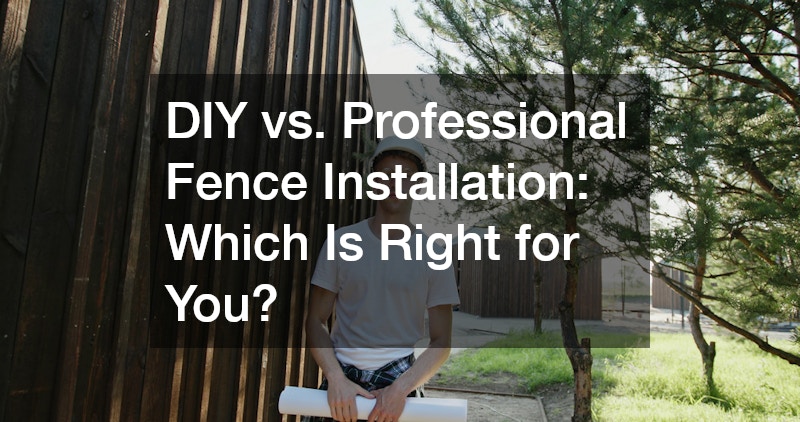Installing a fence is a significant decision for homeowners, as it serves multiple purposes from enhancing security to adding aesthetic value. When considering fence installation, the choice between doing it yourself (DIY) or hiring professionals becomes crucial, as it impacts both the budget and the outcome.
1. What Are the Cost Differences Between DIY and Professional Fence Installation?
1.1 Initial Investment Analysis
Choosing to install a fence yourself can often appear cost-effective initially, as you save on labor costs that professionals charge. However, the choice may involve purchasing or renting tools and materials, which can quickly add up.
Professional services, while initially more expensive due to labor charges, often have access to wholesale prices for materials. This can sometimes balance out the overall cost significantly, especially when considering potential discounts offered by professional companies.
Additionally, mistakes made during self-installation may require costly corrections, whereas professionals are less likely to make errors due to their expertise. Considering all factors, the financial decision can vary based on the individual’s circumstances and available resources.
1.2 Long-term Financial Implications
In the long run, fences installed by professionals might require less maintenance, as they are usually built with higher-quality materials and techniques. This can result in fewer repairs and replacements over time, ultimately saving on costs.
Conversely, DIY fences, while cheaper upfront, may involve more frequent maintenance. The need for repairs or even premature replacement can increase expenses in the long run.
Moreover, a professionally installed fence can potentially increase the property’s resale value due to its presumed durability and aesthetic appeal. This factor is important to consider for homeowners planning to sell their property in the future.
2. How Does Quality Compare Between DIY and Professional Installation?
2.1 Material Quality and Durability
Professionals often use premium materials that offer better longevity and performance compared to those typically available for purchase by individuals. This is due to their professional networks and supply chain connections.
In a DIY scenario, individuals might opt for more accessible and less expensive materials, which might not always meet the same standards of durability. This can impact the overall lifespan and functionality of the fence.
Furthermore, the use of high-quality materials by professionals also translates into fewer environmental impacts, as these fences are more resilient to weather conditions and wear and tear. This is a crucial consideration for properties in areas with harsh climates.
2.2 Craftsmanship and Aesthetic Outcome
The level of craftsmanship in a professionally installed fence is often superior, as trained experts bring years of experience and skill to the task. This results in precise construction and a more aesthetically pleasing outcome.
DIY installations, despite the homeowner’s best efforts, may lack the finesse and attention to detail seen in professional work. The aesthetic results can vary widely, depending heavily on the individual’s skill level.
Additionally, professionals can customize designs to better fit the landscape, enhancing both the beauty and functionality of the fence. This tailored approach is an added advantage for those seeking a specific look or feature from their fencing project.
3. What Are the Time and Effort Considerations of Each Option?
3.1 Time Commitment and Skill Level
DIY fence installation can demand significant time and effort, often requiring homeowners to commit their weekends and evenings to the project. This can be challenging for those balancing work and family commitments.
In contrast, hiring professionals might offer a more convenient solution, as they can often complete the job faster and without the homeowner’s active participation. Their expertise ensures efficiency, which is beneficial when working against time constraints.
The skill level required for a successful DIY installation shouldn’t be underestimated, as it involves tasks that can be complex and demanding. Professionals bring trained expertise to the project, ensuring a smooth and timely completion.
3.2 Project Management and Problem Solving
DIY fence builders may encounter unforeseen challenges that require problem-solving skills, such as dealing with uneven terrain or unexpected weather conditions. Without professional experience, these issues can delay the project.
Professional installers, however, are well-versed in addressing such challenges swiftly and effectively. Their knowledge allows them to adjust plans and continue work with minimal interruptions.
The ability to manage the project as it progresses also involves handling permits and ensuring compliance with local regulations. Professionals often take care of these aspects, reducing stress and potential legal issues for homeowners.
Both DIY and professional fence installation options come with distinct advantages and drawbacks. While DIY can be more budget-friendly if done correctly, professionals offer quality and convenience that might justify their higher cost.
Ultimately, the best choice depends on individual circumstances such as time availability, budget, and personal skill level. A well-considered decision aligns with one’s needs and expectations, ensuring a satisfactory outcome for the fence installation.
Considering aspects like long-term financial implications, material quality, and project management, homeowners can find the most suitable approach to fence their property effectively, enhancing both its aesthetic and functional value.

